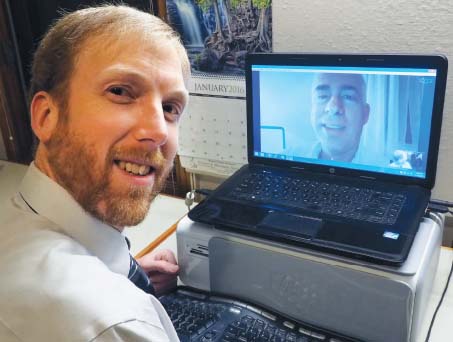Cutting tuition down to size
College Inside Track was featured in the Highland Villager. Click here for a PDF of the article or read below.
Cutting tuition down to size
Business gives families the inside track when it comes to financing a college education

College Inside Track partners Chris Wills of Mendota Heights (left) and Jay Benanav of Merriam Park confer by Skype from their respective home offices. Photo by Brad Stauffer
By Frank Jossi
Bill Shaffer and Nan Waisanen decided a couple of years ago that they needed help navigating the byzantine system for selecting and financing their daughter Olivia’s college education. The Highland Park couple turned to Jay Benanav, the former St. Paul City Council member from Merriam Park, and his business, College Inside Track.
Benanav helped the family select prospective schools, review Olivia’s college applications, fill out financial aid forms and negotiate financial aid packages.
“The cost of college is staggering these days,” Shaffer said. “You try to get what you can in terms of financial aid and the right school, and Jay helped us achieve that. He was great in giving guidance.”
Benanav has had a varied career in state and city government, as an attorney and as Augsburg College’s director of external relations. After experiencing the college selection and financial aid process firsthand with two of his three sons, he founded College Advisors Network in 2005, a business he renamed College Inside Track in 2015.
There is a lot of confusion about the price of college, according to Benanav. “Students don’t know what college costs, and when I tell them it’s anywhere from $20,000 to $70,000 a year, they’re stunned,” he said. “And parents don’t want to tell their children that they can only afford $10,000 or $15,000 a year. If a kid gets accepted into a school that’s too expensive, that’s a difficult discussion.”
“College is the second biggest purchase people make in their lives,” said Mendota Heights entrepreneur Chris Wills, who joined Benanav’s firm last year and is now its president. “And if you have two or three kids, it might be your biggest purchase.”
People hire a Realtor to help them sell their home, Wills said, so why not hire an expert to help them with such a complex and expensive purchase as a college education?
Young adults really should not be graduating from college with an unmanageable debt in student loans, according to Benanav, but many are. “You never get rid of student debt, even if you declare bankruptcy,” he said.
What makes financing a college education so confounding is the high price of tuition, which only truly wealthy families seem to pay. Most of the rest are offered financial aid based on household income, investments and other assets. However, to receive financial aid based on need, families have to fill out the Federal Application for Federal Student Aid (FAFSA), among other forms. Many families will qualify for aid, but just as many will feel it is not enough, Benanav said.
Merit-based aid does not depend on a family’s finances but on a student’s test scores, grade point average and extracurricular activities. “The problem is, many schools don’t give any merit-based aid whatsoever,” Benanav said. “Carleton College, for example, gives financial aid based on need alone,” and a family with a household income of $100,000 or more will receive little tuition assistance from Carleton.
However, plenty of private schools offer merit- and need-based aid that can significantly cut college costs. One of Benanav’s clients, a student with a below-average ACT score and a less than glittering grade point average, got into a private school in Buffalo, New York, with an aid package that reduced tuition to $8,000 less than the tuition charged at a Minnesota state college.
While 75 percent of Benavav’s clients attend private colleges, he also assists clients who enroll in public colleges. In many cases, those institutions offer the best value and the most appropriate programs for students. One of Benanav’s sons attended the University of Wisconsin-Madison because “it was the right fit,” he said.
College Inside Track’s fee for a “comprehensive college counseling” package is a flat $3,675. That may seem high, but the business claims that in the past year 97 percent of its clients got into one of their top three choices for college, and they saved an average of $18,872 per year off the college’s full tuition.
The cost savings through College Inside Track are primarily derived from three services, Wills said. First is the assistance with filling out the FAFSA forms and the CSS Financial Aid Profile used by hundreds of private schools. As many as 40 percent of parents submit incorrect FAFSA forms, he said, unnecessarily inflating their assets by including retirement savings and the value of their home, neither of which is required on the forms. Second, the company aligns students with colleges that are more likely to offer them better aid packages. Third, College Inside Track helps parents appeal the financial aid packages they are offered, asking colleges to come up with a better package. The appeals have saved clients an average of $8,200 a year in tuition costs, according to Wills.
Most families begin working with College Inside Track when their children are juniors in high school. The company offers additional services for more than its $3,675 fee. It will also reduce its fee for families who begin the counseling process late in their child’s high school years, Wills said.
Bill Shaffer and Nan Waisanen’s daughter Olivia applied to 16 colleges before narrowing the list to three. A graduate of Nova Classical Academy, she ended up enrolling at Macalester College because its curriculum best fit her interests and it offered the best aid package.
“It was the right choice,” Bill Shaffer said. “Olivia is really happy at Macalester.”
